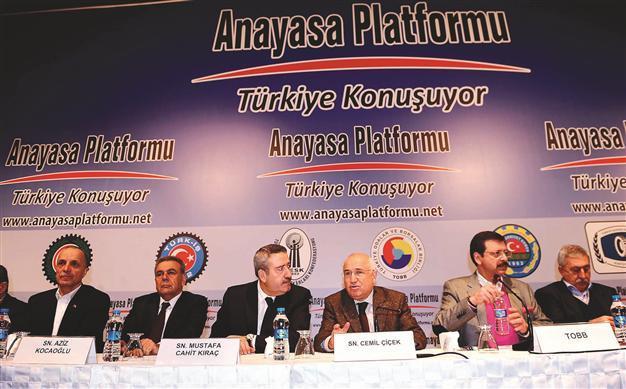Study collects 100 ideas for Turkey’s new charter
ISTANBUL - Hürriyet Daily News

A panel on the preparations of a new constitution was held March 4 in İzmir.
Representatives of Turkish state institutions, political parties and nongovernmental organizations have mapped out suggestions for a new constitution, according to the results of a study that were announced in Istanbul yesterday.However, it remains to be seen whether the “consensus” reached by policymakers in such an informal environment will hold as Turkey enters a crucial period regarding its effort to replace the 1982 military Constitution.
Sabancı University Istanbul Policy Center (IPC) and the National Democratic Institute for International Affairs (NDI) have cooperated in the effort to collect 100 suggestions for a new constitution from about 120 key individuals. These include steps to attain judicial independence, empowering lawmakers, ending “leadership tyranny” in political parties and lowering the general election threshold from the current level of 10 percent, the highest in the world.
The suggestions were taken during hours-long debates that saw input from individuals such as a member from the High Court of Appeals and leading lawmakers. The results have been presented to Parliament’s Constitutional Conciliation Commission, President Abdullah Gül, Parliamentary Speaker Cemil Çiçek and main opposition leader Kemal Kılıçdaroğlu through today, and such meetings will continue.
An end to ‘passing the ball around’
However, the academics who led the study, Fuat Keyman, Mithat Sancar, Ersin Kalaycıoğlu and Ali Yaşar Sarıbay, voiced criticism over the pace and content of the process as they noted the need to end the attitude of “passing the ball around.”
The debate on judicial reform was “the most fundamental and had the highest tension,” Keyman said, while Sancar said problems in this area had turned into “one big spool.” According to Sancar, the suggestions received so far were in essence about “fixing” the 1982 Constitution and not about writing a new charter. “This is because the field has not been prepared for that,” he said.
Sancar also said Gül had “hinted” to them that he perceived a “lack of spirit” in Parliament, including in the Justice and Development Party (AKP) group.
“[Gül] implied that he is uncomfortable with this,” the academic said, adding a rise in “spirit” would be impossible as long as the target were unclear.
Professor Kalaycıoğlu, meanwhile, said they had no idea what kind of vision of democracy was held by political will. “Unfortunately, [our] report does not include an approach that is based on a given democratic model,” he said, complaining that this issue had never been discussed.
The rare effort comes as Çiçek’s complaints about the lack of opinion and debate regarding a new charter became increasingly vocal. In a Dec. 15, 2011, speech, Çiçek criticized NGOs and professional groups for not submitting their opinions. “It’s as if they’re watching a football game [...] Nobody intends to contribute,” he said.
Some suggestions
- The path of appeal should be open for decisions by the Supreme Board of Judges and Prosecutors.
- Extraordinary and special courts have harmed judicial impartiality.
- Parliament should have a bigger role in the selection of Constitutional Court members.
- Lawmakers’ status within the party group should be strengthened.
- Party leadership should be limited to three years.
- The pre-selection method should be implemented in the designation of candidates.
- The election threshold should be pulled down to 4 to 5 percent.
- Lawsuits on party closures should not be the jurisdiction of the Constitutional Court.
















